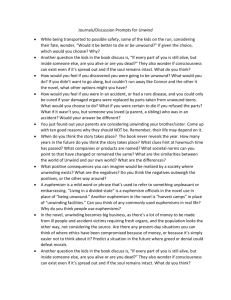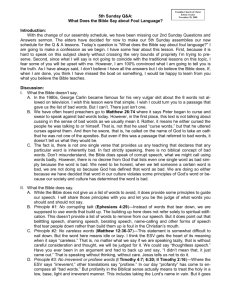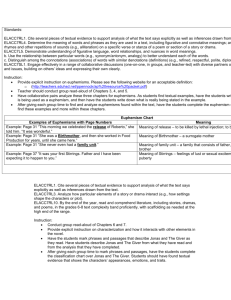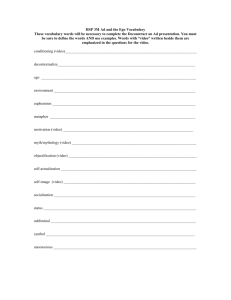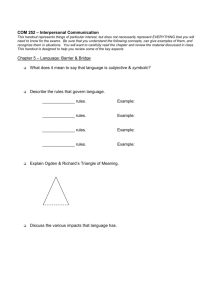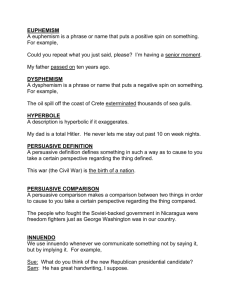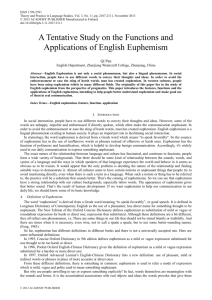A euphemism is an expression intended by the speaker to be less
advertisement
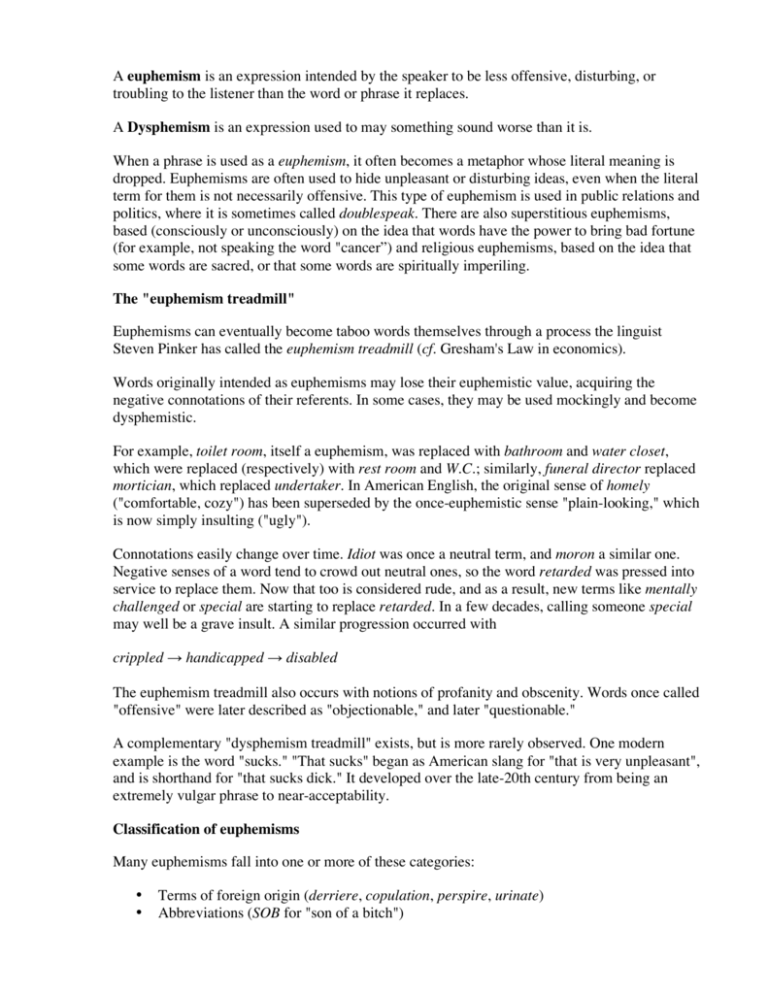
A euphemism is an expression intended by the speaker to be less offensive, disturbing, or troubling to the listener than the word or phrase it replaces. A Dysphemism is an expression used to may something sound worse than it is. When a phrase is used as a euphemism, it often becomes a metaphor whose literal meaning is dropped. Euphemisms are often used to hide unpleasant or disturbing ideas, even when the literal term for them is not necessarily offensive. This type of euphemism is used in public relations and politics, where it is sometimes called doublespeak. There are also superstitious euphemisms, based (consciously or unconsciously) on the idea that words have the power to bring bad fortune (for example, not speaking the word "cancer”) and religious euphemisms, based on the idea that some words are sacred, or that some words are spiritually imperiling. The "euphemism treadmill" Euphemisms can eventually become taboo words themselves through a process the linguist Steven Pinker has called the euphemism treadmill (cf. Gresham's Law in economics). Words originally intended as euphemisms may lose their euphemistic value, acquiring the negative connotations of their referents. In some cases, they may be used mockingly and become dysphemistic. For example, toilet room, itself a euphemism, was replaced with bathroom and water closet, which were replaced (respectively) with rest room and W.C.; similarly, funeral director replaced mortician, which replaced undertaker. In American English, the original sense of homely ("comfortable, cozy") has been superseded by the once-euphemistic sense "plain-looking," which is now simply insulting ("ugly"). Connotations easily change over time. Idiot was once a neutral term, and moron a similar one. Negative senses of a word tend to crowd out neutral ones, so the word retarded was pressed into service to replace them. Now that too is considered rude, and as a result, new terms like mentally challenged or special are starting to replace retarded. In a few decades, calling someone special may well be a grave insult. A similar progression occurred with crippled → handicapped → disabled The euphemism treadmill also occurs with notions of profanity and obscenity. Words once called "offensive" were later described as "objectionable," and later "questionable." A complementary "dysphemism treadmill" exists, but is more rarely observed. One modern example is the word "sucks." "That sucks" began as American slang for "that is very unpleasant", and is shorthand for "that sucks dick." It developed over the late-20th century from being an extremely vulgar phrase to near-acceptability. Classification of euphemisms Many euphemisms fall into one or more of these categories: • • Terms of foreign origin (derriere, copulation, perspire, urinate) Abbreviations (SOB for "son of a bitch") • • • • Abstractions (it, the situation, go) Indirections (behind, unmentionables) Mispronunciation (goldarnit, freakin) Plays on abbreviations ("barbecue sauce" for "bull shit") There is some disagreement over whether certain terms are or are not euphemisms. For example, sometimes the phrase visually impaired is labeled as a politically correct euphemism for blind. However, visual impairment can be a broader term, including, for example, people who have partial sight in one eye, a group that would be excluded by the word blind. There are three antonyms of euphemism, dysphemism, cacophemism, and power word. The first can be either offensive or merely humorously deprecating with the second one generally used more often in the sense of something deliberately offensive. The last is used mainly in arguments to make one's point seem more correct than opponent's. The evolution of euphemisms Euphemisms may be formed in a number of ways. Periphrasis or circumlocution is one of the most common—to "speak around" a given word, implying it without saying it. Over time, circumlocutions become recognized as established euphemisms for particular words or ideas. To alter the pronunciation or spelling of a taboo word (such as a swear word) to form a euphemism is known as taboo deformation. There are an astonishing number of taboo deformations in English, of which many refer to the infamous four-letter words. Bureaucracies such as the military and large corporations frequently spawn euphemisms of a more deliberate (and to some, more sinister) nature. Organizations coin doublespeak expressions to describe objectionable actions in terms that seem neutral or inoffensive. Militaries at war frequently do kill people, sometimes deliberately and sometimes by mistake; in doublespeak, the first may be called neutralizing the target and the second collateral damage. Likewise, industrial unpleasantness such as pollution may be toned down to outgassing or runoff — descriptions of physical processes rather than their damaging consequences. Some of this may simply be the application of precise technical terminology in the place of popular usage, but beyond precision, the advantage of technical terminology may be its lack of emotional undertones, while the disadvantage being the lack of real life context. Doublespeak What distinguishes doublespeak from other euphemisms is its deliberate usage by governmental, military, or corporate institutions. A simple example would be the use of the word casualties instead of deaths, or taking friendly fire as a euphemism for being attacked by your own troops; see other examples on the list of euphemisms. EXAMPLES OF EUPHEMISMS Euphemisms for death The English language contains numerous euphemisms related to dying, death, burial, and the people and places which deal with death. The practice of using euphemisms for death is likely to have originated with the "magical" belief that to speak the word 'death' was to invite death (where to "draw Death's attention" is the ultimate bad-fortune -- a common theory holds that death is a taboo subject in most English-speaking cultures for precisely this reason). Most commonly, one is not dying, rather, fading quickly because the end is near. Death is referred to as having passed away or departed. Deceased is a euphemism for 'dead', and sometimes a dead person may be referred to as "late"(i.e.: "The late (name)"). Sometimes the deceased is said to have gone to a better place, but this is used primarily among the religious with a concept of heaven. There are many euphemisms for the dead body, some polite and some profane, as well as dysphemisms such as worm food, or dead meat. The corpse was once referred to as the shroud (or house or tenement) of clay, and modern funerary workers use terms such as the loved one (title of a novel about Hollywood undertakers by Evelyn Waugh) or the dearly departed. (They themselves have given up the euphemism funeral director for grief therapist, and hold arrangement conferences with relatives.) Among themselves, mortuary technicians often refer to the corpse as the client. Contemporary euphemisms for death tend to be quite colorful, and someone who has died is said to have passed away, passed on, bit the big one, bought the farm, croaked, given up the ghost, kicked the bucket, gone south, tits up, shuffled off this mortal coil (from William Shakespeare's Hamlet), or assumed room temperature. When buried, they may be said to be pushing up daisies or taking a dirt nap. There are hundreds of such expressions in use. Euthanasia also attracts euphemisms. One may put him out of his misery, or put him to sleep, the latter phrase being used primarily with non-human animals. There are a few euphemisms for killing which are neither respectful nor playful, but rather clinical and detached. Some examples of this type are terminate, wet work, to take care of one or to take them for a ride, to do them in, to off, frag, smoke, or waste someone. To cut loose (from U.S. Sgt. Massey's account of activities during the occupation of Iraq of the early 21st century) or open up on someone, means 'to shoot at with every weapon available'. Common examples Other common euphemisms include: • • • • • • • • • restroom for toilet room (the word toilet was itself originally a euphemism). This is an Americanism. making love to, playing with or sleeping with for having sexual intercourse with motion discomfort bag and air-sickness bag for vomit bag sanitary landfill for garbage dump the big C for cancer (in addition, some people whisper the word when they say it in public, and doctors have euphemisms to use in front of patients) bathroom tissue or bath tissue for toilet paper (Usually used by toilet paper manufacturers) custodian for janitor (also originally a euphemism—in Latin, it means doorman.) sanitation worker for "garbage man" mixologist for bartender • Where can I wash my hands? or Where can I powder my nose? for Where can I find a toilet?. (This is also an Americanism. If this question is asked in Europe to someone not used to American habits the person who asks the question might actually end up at a place where there just only is a washbasin and not at a place equipped according to their needs. On the other hand, Americans might find the more direct question rude if asked by Europeans who don't know about this euphemism.) The inflation of occupational titles is similar to the euphemism treadmill. For instance, the engineering professions have traditionally resisted the tendency by other technical trades to appropriate the prestige of the title engineer. Most people calling themselves software engineers or network engineers are not, in fact, accredited in engineering. Extreme cases, such as sanitation engineer for janitor are cited humorously more often than they are used seriously. The word euphemism itself can be used as a euphemism. In the animated short It's Grinch Night (See Dr. Seuss), a child asks to go to the euphemism, where euphemism is being used as a euphemism for outhouse. Wikipedia List of euphemisms and Doublespeak Corporate • • • • • • • • layoff, downsize, rightsize, headcount adjustment, RIF (reduction in force), realignment: mass firing of employees, usually due to business restructuring or economic conditions also counseled out, made redundant, let go, dismissed, terminated, services are no longer required, et cetera, for firing in general The Dilbert series satirizes this in one strip in which an employee is unable to figure out he has been laid off. job flexibility: lack of job security (where job security means an actual or implied promise of continued employment) outsource: firing local employees to hire cheaper labor elsewhere. replacement workers: scabs or strikebreakers in labor disputes reliability enhancement: fix for a software bug. escourt from premises: kicked out/thrown out of building Espionage • • classified: in general usage, "secret"; in governmental usage, information which has been evaluated and possibly assigned a security clearance. Since at least World War II, United States military and governmental information has been distinguished into classes corresponding to increasing levels of security clearances required by those people allowed access to it, and has come to be called classified • • • • • • • information (as in "classified for a particular clearance"). unclassified: in general usage, "not secret"; in governmental usage, information which has not been assigned a security clearance.Information which has not been assigned a classification; most public information falls into this category, which is the default state of information. Stands in contrast to information which has been evaluated and classified as "Public". declassified: in general and governmental usage, formerly but not presently secretInformation which had as some point been classified as secret, but has since been released to the public. intelligence: information and sources of information (spies and spying) human intelligence: information from spies and interrogated prisoners, and other information from human sources (such as weather reports or economic studies) used by a secret or military agency asset: a secret agency's recruited, clandestine human source in a foreign country (foreign spies) wet work: assassination physical persuasion or physical pressure: torture Military • • • • • • • • • • • • • • • • • • defense: war, as in the United States Department of Defense, formed by the merging of the Department of War and Department of the Navy neutralize or service: to kill or disable a target friendly fire: being inadvertently and mistakenly attacked by your allies collateral damage: unintentional killing or damage; bystander deaths and injuries area denial munitions: landmines bombs which kill civilians are, according to The Pentagon, "incontinent ordnance" (Lutz) preemptive war: to invade a foreign country so that the invading nation would not be invaded itself or be subjected to an enemy strike early on pre-hostility: peace secure an area (or mop up): kill remaining enemy soldiers aerial ordnance: the use of bombs or missiles by air asymmetric warfare: local violence or unrest, suicide bombing; contained violence. casualty: death or injury post-traumatic stress disorder, a euphemism for operational exhaustion, euphemism for battle fatigue, a euphemism for shell shock. Used as an example of dehumanization of language (particularly by the American comedian George Carlin). The terms were used in the Vietnam War, Korean War, World War II and World War I respectively. Note, however, that Post-traumatic stress disorder is also triggered by other traumatic events, such as rape. engage: to fight the enemy head on engagement: a small battle, a brief firefight projectile: anything that can be fired at the enemy, such as bullets, artillery shells, rockets terrorist: criminal or rebel - Criminals are usually jailed, while terrorists are often shot or bombed. toublemaker, treasonist, criminal, terrorist, unpatriotic: often names for rebel, • • • • • revolutionary, or folk heroes, especially by oppressive governments extreme prejudice: kill without mercy regime change: dethroning the current government/dynasty surgical strike: bombing attack by plane psychological deterrent: the largest (non nuclear) bombs, such as the Hellfire missle, Daisy Cutter, and M.O.B. - The existance of a large bomb prevents the enemy from attacking, in theory. tough love, tough decision, Good vs. Evil, ethics: key words used to justify war through moral reasoning Political • • • • • • • • • • • • • • • • • • • final solution (Endlösung): The Holocaust Doublespeak was very common in the Third Reich. Goebbels' Reichsministerium für Volksaufklärung und Propaganda (Ministry of the Reich for Public Enlightenment and Propaganda) coined thousands of new German words. Other examples include: Concentration Camp (labor/death camp), Heim ins Reich (occupation of Austria), the meanings of Volk (people) and Rasse (race). ethnic cleansing: genocide freedom fighter: armed political rebel (positive term) taxpayer: citizen The word "taxpayer" means an individual or business that pays taxes, and when used in a discussion of government revenues is not doublespeak. However, using the term interchangeably with "citizen" does two things. One, it disguises the fact that political policies that apply to individual taxpayers also apply to corporate taxpayers. Two, it appeals to middle-class citizens by excluding welfare beneficiaries and others perceived to pay little or no tax. More subtly, use of this term dilutes the idea of citizenship itself, and implies that there is nothing more to society than mere economic rationalism, as per Margaret Thatcher's famous pronouncement. This usage has become popular in the names of certain conservative groups, for example, Taxpayers for Common Sense and National Taxpayers Union in the United States, the Canadian Taxpayers Federation and the lobby group Association of Consumers and Taxpayers in New Zealand. internment facility: prison protective custody: imprisonment without due process of law intervention: invasion executive action: assassination campaign contribution, donation, fund raiser: bribery of public officials budget surplus: profit advertising, self promotion: propaganda cult: religion special interests, foreign interests: representatives and lobbyists of businesses dealing in oil, diamonds, gold, and other profitable resources abroad disturbing the peace, noise pollution, slander, defamation, treason, inciting a riot, public speaking without a permit: free speech public donation, shared sacrifice: taxes progressive: leftist piracy: copyright infringement (ie copying a copyrighted work without permission/license) • • family values, pro-family, etc.: when used by conservatives, generally suggests some combination homophobia, heterosexism, and/or patriarchy (and the political goals of oppressing homosexuals and women) developing country Law enforcement • • • • • • • • • following a suspect: stalking investigation, search: invasion of privacy gain access: trespass, breaking and entering confiscate, seize assets : police or government steals arrest, imprison, incarcerate, take into custody, contain: police or government kidnaps/abducts pacify: beat contempt of court: opinion subpoena: force to talk harboring a criminal: to allow a friend to live or hide who is wanted by police Social • • • • • • • • • • • • • • job seekers: the unemployed asylum seekers: refugees suspected illegal entrants or illegals: used when asylum seekers is considered to grant too much legitimacy unsavory character: criminal (or, more specifically suspected criminal) involuntary conversion: plane crash -- a vanishingly rare usage, and included only for curiosity's sake. differently abled: disabled sales advisor: shop assistant senior citizen: old person visually impaired: blind or nearly so comfort women: prostitute, later specifically women forced into sexual slavery during World War II (see also Joy Division (World War II)) Customer Service Representative: a title given to today's bank tellers illegal alien: illegal immigrants urban: African American. For example, "urban contemporary music" refers to rap, hiphop and other forms of popular music stereotypically associated with African Americans. counter culture: lifestyles different from the mainstream, alternative music fans, intellectuals who think differently, communes, hippies, flower children Sports • • cost certainty: salary-cap; often used by NHL commissioner Gary Bettman during his negotiations with the NHL Players Association during the 2004-05 NHL lockout; Bettman wants to impose a salary cap on NHL teams incident: a fight, or some other violent action such as a slash in hockey that results in • • • • • • suspension and/or fine, or a fight between a player and a fan upper/lower body injury: often used in hockey, this term implies that a player is injured but the specifics of the injury are not disclosed; especially used during playoff time so that opposing teams will not be able to find out the extent of the players' injuries; for example, a leg injury can be classified as a "lower body injury", a shoulder injury can be classified as an "upper body injury" scratch: used in hockey, implies that a player is taken off the roster for a game usually due to injury (scratching a player off the roster list); a healthy scratch means that the player (usually a struggling player) is taken off the roster due to the coach's decision, not because of an injury contraction: a plan to reduce (fold) a number of teams in a league in the hopes of increasing its competitiveness and reducing the financial losses of the league; Major League Baseball once considered folding two teams, widely thought to be the Minnesota Twins and Montreal Expos objects: things thrown onto the field resulting in the disruption of a game/match, such as bottles, cups, flares seeking a trade: a sign that a player badly wants out of his current team for various reasons advisor: a position at the executive level whose job is to advise the General Manager and/or President of a team; hiring an advisor usually implies that there is a degree of incompetency at the management level Other • • • • terminated: Mafia-style killings spontaneous energetic disassembly for "explosion" (reportedly used by a director of the Three Mile Island nuclear power plant) computer-implemented invention: computer programming method in the context of patent law, because software patents are a controversial topic deactivating satellite receivers: doing malicious damage to receiver firmware in response to widespread pirate decryption problems (this euphemism was used in Globe and Mail coverage of Bell ExpressVu - both just happen to be owned by the same company)



